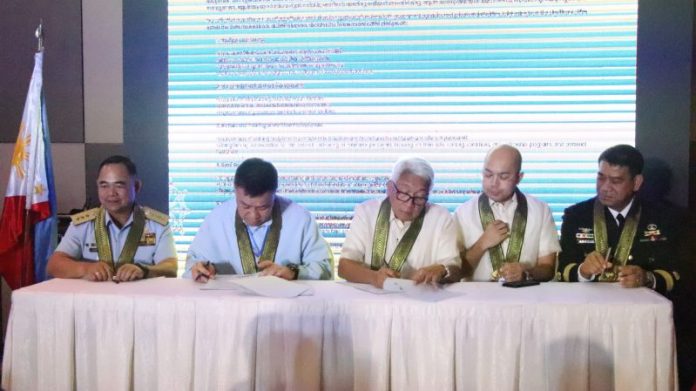
-
Government agencies and maritime groups commit to safer seas and sustainable industry
-
Manifesto focuses on improving navigation safety, modernizing infrastructure, supporting professionals, ensuring good governance, and strengthening support mechanisms
-
Commitments include expanding Vessel Traffic Monitoring Systems, assessing and maintaining Aids to Navigation, improving meteorological and navigational warning mechanisms, and developing maritime infrastructure, welfare, and training programs
Various government agencies and maritime industry associations signed a manifesto committing to enhancing maritime safety, preserving the marine environment, and fostering a resilient and sustainable maritime industry at the Philippine Maritime Safety Summit 2023 on November 15.
Maritime Industry Authority (MARINA) administrator Hernani Fabia said the safety summit aligns with the 10-year Maritime Industry Development Plan, prioritizing the enhancement of maritime transport safety and security to improve the safety and efficiency of Philippine ships and promote cooperation between regions.
READ: MARINA updates maritime industry development plan
The manifesto identified key focus areas, including enhancing navigational safety, modernizing maritime infrastructure, promoting the welfare and training of maritime professionals, ensuring good governance, and strengthening support mechanisms.
As a signatory to the 1974 International Convention for the Safety of Life at Sea (SOLAS Convention), the Philippines pledged to uphold the highest standards of ship construction, equipment, and operation to ensure safety compatibility.
“We recognize that the challenges and opportunities of the maritime industry, encompassing safety, fleet management, regulatory standards, navigational aids, weather forecasting, and seafarer well-being, require a comprehensive assessment to improve ship safety regulations,” the manifesto read.
On navigational safety, signatories committed to expanding the Vessel Traffic Monitoring Systems, assessing and maintaining Aids to Navigation, ensuring access to up-to-date nautical charts, and improving meteorological and navigational warning mechanisms.
Maritime infrastructure development programs include expanding of shipbuilding and ship repair facilities, establishing of rescue and communication centers, and improving passenger terminals and port facilities.
Welfare and training commitments focused on improving programs to promote safe practices for seafarers and offshore personnel, strengthening collaboration for the overall well-being of maritime personnel, and enhancing their working conditions, apprenticeship programs, and personal insurance.
Pledges for good governance involved strengthening compliance monitoring and enforcement of maritime regulations, collaboration among maritime regulators and stakeholders on safety policy issues, and engaging with relevant maritime stakeholders on trends, technology, knowledge gaps, and data privacy violations.
Support mechanisms included strengthening search and rescue capabilities through exercises, persuading investors, enhancing fund facilities, encouraging government facilitation in funding maritime infrastructures, and promoting a safety culture among maritime stakeholders and local communities through information, education, and campaigns.
Signatories, including Fabia, Transport undersecretary for maritime Elmer Francisco Sarmiento, Energy undersecretary Giovanni Carlo Bacordo, Transport assistant secretary for maritime Julius Yano, Philippine Coast Guard maritime services command Joseph Coyme, Philippine Merchant Marine Academy president Joel Abutal, and representatives from various government agencies, as well as private sector entities such as the Lighterage Association of the Philippines and the Shipyard Association of the Philippines, affirmed their commitment by signing the manifesto.
In addition to the manifesto, MARINA highlighted resolutions from pre-safety summit meetings held in Cebu, Batangas, and Zamboanga from September to October. These resolutions outlined commitments from relevant government agencies and stakeholders to establish minimum standards for ship construction, equipment, and operations. The goals are to ensure safety, maintain the seaworthiness of Philippine-flagged vessels, secure transportation for passengers and cargo, and coordinate effectively for maritime safety objectives.
The Philippine Maritime Safety Summit is an annual event that gathers key stakeholders, experts, and leaders in the maritime industry with the aim of addressing critical issues and discussing strategies for ensuring a safer and more resilient maritime transport system. – Roumina Pablo




